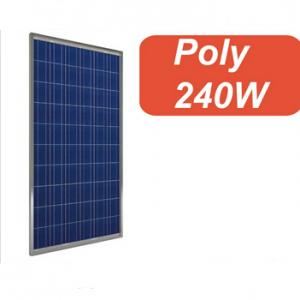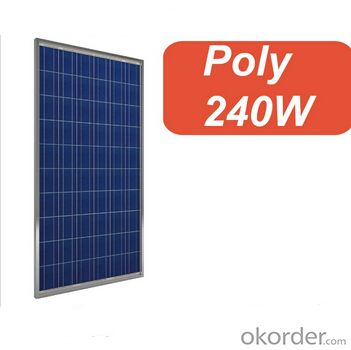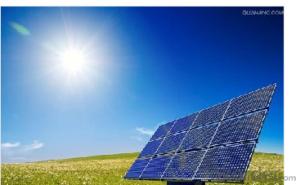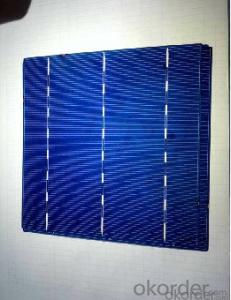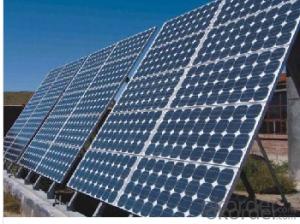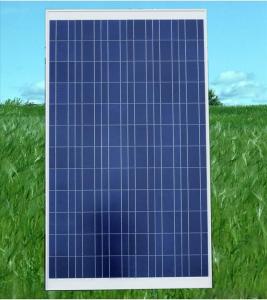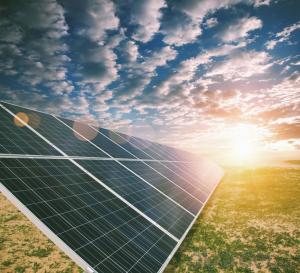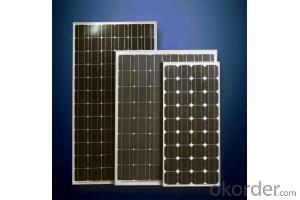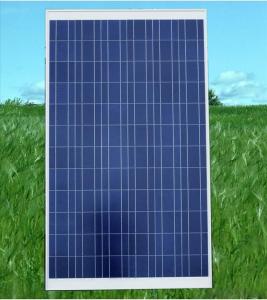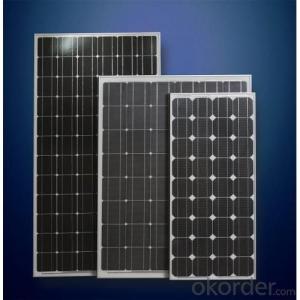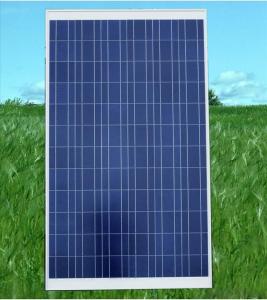Small Solar Panels for Lights:240W Polycrystalline Solar Module
- Loading Port:
- SHANGHAI
- Payment Terms:
- TT or LC
- Min Order Qty:
- 6000 watt
- Supply Capability:
- 10000000 watt/month
OKorder Service Pledge
OKorder Financial Service
You Might Also Like
Description:
Solar modules use light energy (photons) from the sun to generate electricity through the photovoltaic effect.
The majority of modules use wafer-based crystalline silicon cells or thin-film cells based on cadmium telluride or silicon.
The structural (load carrying) member of a module can either be the top layer or the back layer.
Cells must also be protected from mechanical damage and moisture. Most solar modules are rigid, but semi-flexible ones are available,
based on thin-film cells. These early solar modules were first used in space in 1958.
CNBM Solar photovoltaic (PV) Panel is designed for large electrical power requirements.
It is the optimal choice for both on-grid and off-grid power systems.
CNBM Solar panel offers high performance of power per square foot of solar array.
Monocrystalline silicon(c-Si): often made using the Czochralski process. Single-crystal wafer cells tend to be expensive,
and because they are cut from cylindrical ingots, do not completely cover a square solar cell module without a substantial waste of refined silicon.
Hence most c-Si panels have uncovered gaps at the four corners of the cells.
Characteristics of Solar Monocrystalline
I. Solar Cell : High efficiency crystalline solar cell.
Even if under the weak light, the solar module can produce maximum power output.
II. Tempered glass (toughened glass): Anti-reflecting coating and high transmission rate glass increase
the power output and mechanical strength of solar module.
III. EVA and TPT: Using high quality EVA and TPT to prevent destroying and water.
IV. AI frame: Without screw, corner connection. 6 holes on the frame can be installed easily.
V. Junction box: Multi function junction box with water proof.
VI. Long lifetime: ≥25 years; Less power decrease.
VII. Good performance of preventing from atrocious weather such as wind and hails.
VIII. Resisting moisture and etching effectively, not effected by geology.
IX. The certificate issued by international authority: UL, TUV, IEC, VDE, CE.
Characteristics | Unit | 240W |
Maximum Power (Pmax) | W | 240 |
Power Tolerance | W | (0,+5) |
Maximum Power Voltage (Vmp) | V | 30.50 |
Maximum Power Current (Imp) | A | 7.86 |
Open Circuit Voltage (Voc) | V | 37.70 |
Short Circuit Current (Isc) | A | 8.50 |
Module Efficiency (ηm) | % | 16.35 |
Dimension of module | mm | 1480*992*40mm(64.6*39.1*1.6inch) |
Pmax Temperature Coefficient | %/C | -0.44 |
Voc Temperature Coefficient | %/C | -0.32 |
Isc Temperature Coefficient | %/C | 0.44 |
Maximum System Voltage | VDC | 1000(TUV);600(UL) |
Maximum Series Fuse Rating | A | 15 |
Operating Temperature | C | -40~ +85 |
NOCT | C | 45±2 |
STC:1000W/m2.AM1.5 and 25C cell temperature, NOCT : Nominal Operating Cell Temperature | ||
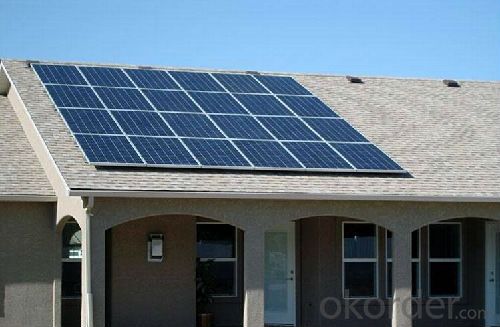
FAQ:
1. How long will my inquiry get response?
Your inquiry related to our products or prices will be replied within 24 hours.
2. Can I get professional service and suggestion?
Well-trained and experienced staffs to answer all your questions in fluent English.
3. Do you accept OEM or customized design?
OEM & ODM, any your customized lightings we can help you to design and put into product.
4. What if I need specific design?
Distributorship are offered for your unique design and some our current models.
- Q: How do solar panels reduce carbon emissions?
- Solar panels reduce carbon emissions by generating electricity from sunlight, which is a clean and renewable energy source. Unlike fossil fuels, solar power does not produce any greenhouse gas emissions or pollutants during operation. By replacing traditional energy sources, such as coal or gas-fired power plants, with solar panels, we can significantly reduce the amount of carbon dioxide and other harmful emissions that are released into the atmosphere, helping to mitigate climate change and improve air quality.
- Q: what is a solar panel?
- A solar panel is essentially a battery charger that transforms sunlight into an electrical DC (direct current)charge.
- Q: Can solar panels be installed on commercial buildings?
- Yes, solar panels can be installed on commercial buildings. In fact, many businesses and organizations are increasingly opting for solar panel installations to reduce their energy costs and environmental impact. By harnessing sunlight and converting it into electricity, solar panels provide a sustainable and renewable source of power for commercial operations.
- Q: Do they really save energy? Cut or almost eliminate your electricity bill, if so, how much?Do they have a reserve unit to save electricity that I don't use, to use when the sun is not out?Can it produce enough electricity to cool a house and keep lights and appliances runningLastly, how much are the panels are running for.
- Instead of paying for electricity, for the past three years I've actually ended up with a cheque from the power company believe it or not! :) I got some extremely cheap solar panels from this guide I read, I'll try and find a link for you.. that's one less thing to worry about during the recession I suppose! Haha The guide I used was here: tiny /solar789 my mum was the one who said I should take a look at it, since she's been using the techniques for donkey's years.
- Q: Can solar panels be installed in a community or neighborhood?
- Yes, solar panels can be installed in a community or neighborhood. In fact, many communities and neighborhoods are increasingly adopting solar energy as a sustainable and clean alternative to traditional power sources. These installations can be done on residential rooftops, community buildings, or even as shared solar projects where multiple households can benefit from a single solar installation. Installing solar panels in a community or neighborhood not only helps reduce carbon emissions but also promotes energy independence and cost savings for residents.
- Q: Can solar panels be used to power an entire office building?
- Yes, solar panels can be used to power an entire office building. By installing a sufficient number of solar panels on the roof or in a separate solar farm, it is possible to generate enough electricity to meet the energy demands of an office building. Additionally, advancements in solar panel technology and energy storage systems make it more feasible to rely solely on solar power for an office building's energy needs.
- Q: Can solar panels be installed on a rental property?
- Yes, solar panels can be installed on a rental property. However, it is important to check with the property owner or landlord before proceeding with the installation. Some landlords may have specific policies or restrictions regarding modifications to the property, so it is necessary to obtain their permission and potentially negotiate the terms of the installation.
- Q: Can solar panels work in the shade?
- Why pay thousands of dollars for solar energy ($27,000 average cost) when you can build your own solar panel system for just a fraction of the retail cost. You can build a single solar panel or you can build an entire array of panels to power your whole house. Some people are saving 50% on their power bill, some people are reducing their bill to nothing. But what’s most impressive is that just by following these instructions some are even making the power company pay them!
- Q: Can solar panels be used for irrigation systems?
- Yes, solar panels can be used for irrigation systems. Solar panels can generate electricity which can power the pumps and other components of an irrigation system, reducing the reliance on traditional power sources and making it a more sustainable and cost-effective solution.
- Q: How do solar panels affect the roof's integrity?
- Solar panels can have a positive impact on a roof's integrity. By acting as a protective layer, solar panels shield the roof from various weather elements, including harmful UV rays, hail, and debris. Additionally, they can help to extend the lifespan of the roof by reducing exposure to extreme temperatures. However, it is crucial to ensure proper installation by professionals to avoid any potential damage or leaks.
Send your message to us
Small Solar Panels for Lights:240W Polycrystalline Solar Module
- Loading Port:
- SHANGHAI
- Payment Terms:
- TT or LC
- Min Order Qty:
- 6000 watt
- Supply Capability:
- 10000000 watt/month
OKorder Service Pledge
OKorder Financial Service
Similar products
Hot products
Hot Searches
Related keywords
